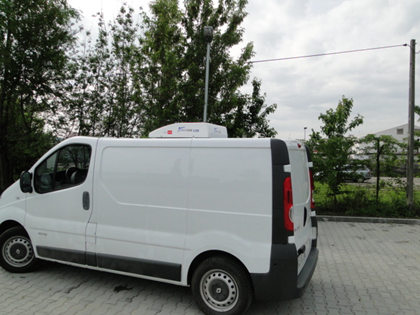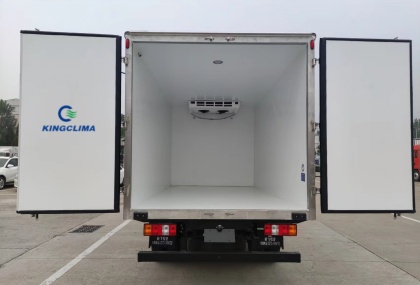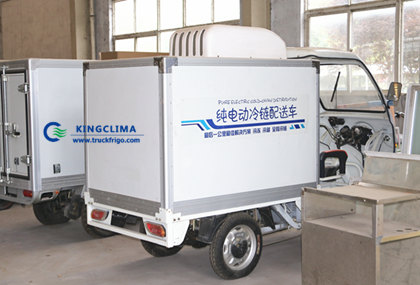Correctly maintain your truck refrfigeration units in the winter
Maintaining your truck refrigeration unit during the winter is essential to ensure its reliability and performance when transporting temperature-sensitive goods. Winter conditions can present unique challenges, such as freezing temperatures, snow, and ice. Here’s a comprehensive guide to maintaining your truck refrigeration unit in winter:
1. Inspect the System Thoroughly
Check Refrigerant Levels:
Ensure the refrigerant is at the correct level, as low refrigerant can affect the unit’s performance.
Inspect Hoses and Belts:
Look for cracks, wear, or looseness that could worsen in colder conditions.
Examine Electrical Components:
Check the wiring and connectors for corrosion or damage caused by moisture.
2. Protect the Condenser and Evaporator
Clean the Condenser:
Remove any debris, dirt, or ice buildup that could block airflow.
Inspect the Evaporator Coils:
Ensure they are clean and free of frost or ice, as frozen coils can reduce efficiency.
Defrost Regularly:
Use the unit’s defrost function to prevent ice accumulation on the evaporator.
.jpg)
3. Test the Heating Function
If the refrigeration unit has a heating or defrost mode, test it to ensure it can maintain the correct temperature during freezing conditions.
Ensure that the unit can switch efficiently between cooling and heating modes, if applicable.
4. Keep the Unit Running Periodically
Operate the Unit:
Run the refrigeration unit periodically, even if it’s not in use, to keep the system lubricated and prevent parts from seizing.
Maintain Temperature Settings:
Ensure the unit can maintain consistent temperatures in both cooling and heating modes.
5. Monitor the Battery and Power Source
Inspect the Battery:
Cold weather can reduce battery efficiency. Check the battery voltage and charge level.
Check Connections:
Ensure all connections to the power source are tight and free from corrosion.
Use Proper Insulation:
Ensure the truck’s cargo area is well-insulated to reduce the load on the refrigeration unit.
6. Replace the Air Filter
A clean air filter is critical for proper airflow. Replace or clean the filter to prevent blockages that could strain the system.

7. Lubricate Moving Parts
Use appropriate lubricants for hinges, latches, and other moving parts exposed to cold to prevent them from freezing or stiffening.
8. Protect Against Moisture
Seal Openings:
Ensure all seals and gaskets are intact to prevent moisture and cold air from entering the cargo space.
Dry the System:
Remove moisture from hoses and connections to prevent freezing.
9. Use Proper Fuel and Fluids
Winterized Fuel:
If your unit uses a diesel-powered engine, use winterized diesel fuel to prevent gelling.
Anti-Freeze Coolant:
Ensure the coolant system has an appropriate anti-freeze mixture for winter temperatures.
10. Monitor the Temperature Regularly
Real-Time Monitoring:
Use temperature sensors to track the cargo area’s temperature and ensure it stays within the desired range.
Respond to Alarms:
Pay attention to temperature alarms and address issues immediately.
11. Keep Spare Parts and Tools
Carry essential spare parts like belts, hoses, and fuses, as well as tools for quick repairs in case of breakdowns in remote locations.
12. Train Drivers and Operators
Educate drivers on proper operation and maintenance of the refrigeration unit during winter, including defrosting, monitoring, and basic troubleshooting.
13. Schedule Professional Maintenance
Have the unit inspected and serviced by a professional technician before and during winter to identify and fix potential problems.
14. Practice Safe Loading and Unloading
Quick Access:
Minimize the time the cargo door is open to maintain internal temperature.
Pre-Cool or Pre-Heat:
Prepare the cargo space to the desired temperature before loading goods.
15. Preventive Measures for Storage
If the refrigeration unit is not in use during the winter:
Drain refrigerant and fluids as recommended by the manufacturer.
Store in a dry, temperature-controlled environment.
Cover exposed components to protect them from snow, ice, and moisture.
Conclusion
Proper winter maintenance ensures your truck refrigeration unit remains operational and reliable in cold weather, protecting your goods and reducing repair costs. Regular inspections, cleaning, and proactive measures will keep the unit running efficiently throughout the season.
As a professional truck refrigeration unit supplier, Kingclima offer 7*24 professional and patient help, if you need, please feel free to contact us at anytime.
.jpg)



